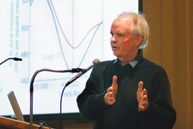Global warming expert not full of hot air
Global warming expert not full of hot air McGill University
User Tools (skip):
Global warming expert not full of hot air
While it may be hard to imagine that agriculture has had such an enormous effect on climate, William Ruddiman asserts that farmers were affecting the global climate well before the industrial revolution. On March 8, the author of Plows, Plagues and Petroleum delivered the Mini-Beatty Lecture, "How did Humans First Alter Global Climate?"

William Ruddiman outlines his radical global warming theory at the Mini-Beatty Lecture.
Owen Egan
Ruddiman, Professor Emeritus of Environmental Sciences at the University of Virginia, first compared current interglaciation, the relatively mild stretch between ice ages, to the previous three interglaciations - about 100,0000, 200,000 and 300,000 years ago - believing that the previous three should be fairly good predictors of what is happening today. He examined carbon dioxide and methane concentrations in the atmosphere from each interglacial period by using data from ice core samples. By this point, Ruddiman said the previous three interglaciations' levels of carbon dioxide had already peaked and were declining. The current period shows a peak and then, instead of declining, methane and carbon dioxide concentrations increase again.
He sees the use of land for agriculture as a reason for the increase in greenhouse gases, since this involved increased deforestation and irrigation for rice and cereal crops. "If you're doing agriculture in a forest, you have to cut trees and if you cut trees whether you burn them or let them rot, that's carbon dioxide going into the atmosphere."
"Five thousand years ago, people started to irrigate for rice on a fairly extensive scale," he said. As early as 10,000 years ago, humans were growing crops and began domesticating animals. As agriculture spread, forested areas were claimed by people as farmland or grazing pastures.
"The natural trend would have been for global temperatures to go much lower and for the greenhouse gas levels to have gone down, but we pushed them to go up and this greenhouse effect kept us from getting to the threshold of the next ice age." Ruddiman ran a model with colleagues John Kutzbach and Steve Vavrus to see what kind of climate we would currently have if there were no greenhouse gases caused by human activity. The model set carbon dioxide and methane levels to what they would be today without the human effect and the climate cooled substantially. "It would be on average seven degrees colder over Hudson Bay. Ice would be accumulating."
In the past, skeptics of global warming dismissed his hypothesis out of hand, claiming greenhouse gases caused by human activity are good because they averted an ice age. Ruddiman counters that his research shows how sensitive our climate is to human activity. "I'm a mainstream person about global warming. It's going to be large, to very large."

